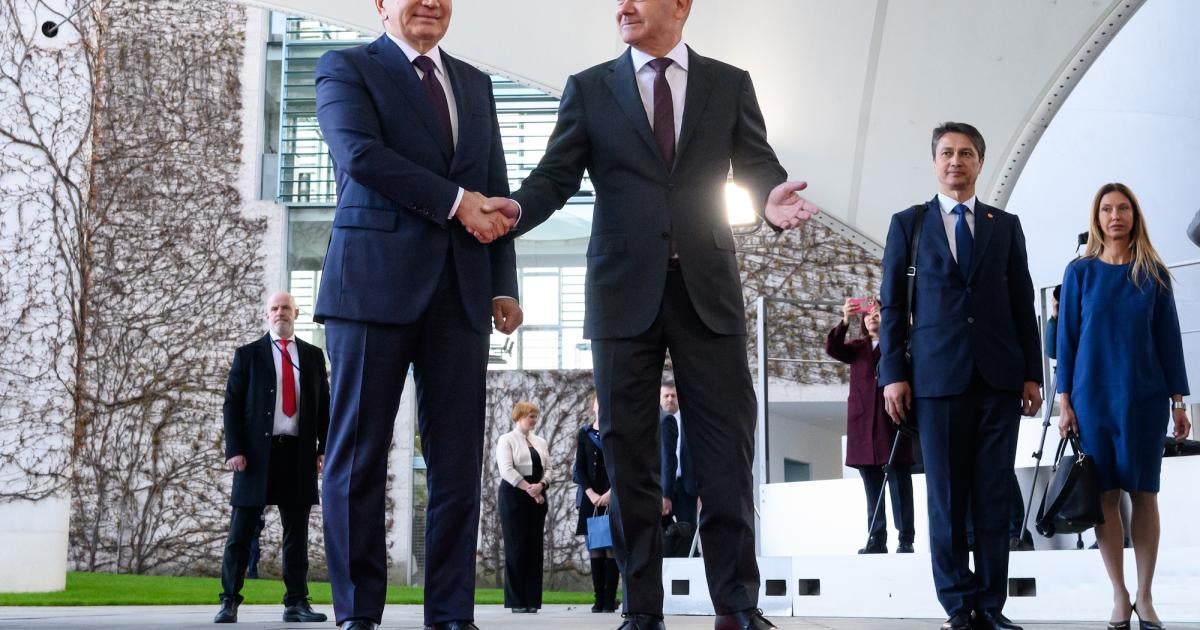German Chancellor Olaf Scholz urged Russian President Vladimir Putin to engage in direct negotiations with Ukraine, emphasizing the importance of a diplomatic solution as Ukraine’s armed forces face increasingly dire conditions on the front lines. The appeal, made during a phone call between the two leaders, comes amid reports of severe shortages of arms, personnel, and logistics for the Ukrainian military, as well as steady advances by Russian forces in key contested areas.
This development highlights the growing challenges Ukraine faces as the war, now well into its second year, grinds on without a clear end in sight. Scholz, whose government has been a staunch supporter of Ukraine since Russia’s invasion in February 2022, also underscored the urgent need for diplomatic avenues to address the ongoing conflict and its devastating impact on the region.
Ukraine Faces Severe Strain on the Battlefield
The situation on the battlefield has become increasingly difficult for Ukraine. According to military analysts and Ukrainian officials, Ukraine’s military is facing several critical issues, including inadequate supplies of ammunition, shortages of advanced weaponry, and a lack of trained personnel to replace the heavy losses sustained in months of fierce combat.
Ukraine has consistently appealed to its international partners for more advanced weaponry and military support. However, despite efforts to secure additional arms shipments from NATO countries, there are mounting concerns that supplies may not be able to keep pace with the pace of combat. Artillery shells, air defense systems, and armored vehicles are in particularly short supply. Meanwhile, Ukrainian forces are struggling to retain control of key eastern and southern territories, where Russian troops have made incremental advances.
Reports from the Institute for the Study of War (ISW) and other defense think tanks indicate that Russian forces, bolstered by heavy artillery and increasingly sophisticated air operations, have gained some ground in the Donbas region and around the strategically important Zaporizhzhia and Kherson areas. Ukraine’s defensive efforts, though resilient, have become more strained as they try to stave off Russian advances.
Scholz’s Diplomacy: Push for Negotiations
In his conversation with Putin, Scholz expressed concern about the humanitarian toll of the war and emphasized that a resolution could only be achieved through negotiations. Scholz, who has positioned Germany as a leading diplomatic actor within Europe, has been consistent in advocating for peace talks, although his calls for dialogue have met with resistance from both Moscow and parts of the Ukrainian government, which has vowed to regain full sovereignty over all occupied territories.
Germany has long been one of Ukraine’s most significant supporters, second only to the United States in terms of military aid and financial backing. Berlin has provided Ukraine with billions of euros in weapons, training, and financial assistance. Scholz, a former leader of the Social Democratic Party (SPD), has faced criticism from some members of his own party for being too cautious in supporting Ukraine militarily, while others have praised his efforts to balance military aid with a push for diplomatic solutions.
In the phone call with Putin, Scholz urged the Russian president to open the door to direct talks with Ukrainian President Volodymyr Zelenskyy, who has previously insisted that peace negotiations could only take place once Russian forces withdraw from Ukrainian territory. Scholz’s call for negotiations also aligns with broader European diplomatic efforts, which seek to bring all sides to the table despite the ongoing hostilities.
The Growing Role of European Diplomacy
As Ukraine faces mounting challenges, European leaders are increasingly trying to navigate a complex diplomatic landscape. France’s President Emmanuel Macron, Italian Prime Minister Giorgia Meloni, and others have echoed calls for dialogue, although their positions differ on the timeline for peace talks. Some leaders have urged Ukraine to consider a ceasefire or peace agreement as a way to preserve Ukrainian sovereignty, while others, including the Baltic states, have remained firmly committed to supporting Ukraine’s right to continue fighting.
The European Union has been a central player in coordinating support for Ukraine, both in terms of financial aid and sanctions against Russia. The EU’s stance, however, is not unified. While some nations, particularly those in Central and Eastern Europe, have pushed for maximum support to ensure Russia is deterred, others, such as Germany, have balanced military support with a desire for a negotiated settlement.
The Future of U.S. Support for Ukraine
Germany’s concerns about future U.S. support for Ukraine also loom large. The future of U.S. backing is uncertain, particularly in light of the ongoing 2024 presidential election and the possibility that Donald Trump, the Republican frontrunner, could return to the White House. Trump has previously expressed a desire to end U.S. involvement in the conflict, questioning the amount of money and military support Washington has sent to Kyiv.
Germany has recognized that it cannot carry the burden of military and financial support for Ukraine alone. Scholz has pushed for more robust European support, and Germany is hoping for a stronger European defense capability to reduce dependency on the U.S., particularly if political dynamics shift in Washington.
Conclusion
Chancellor Scholz’s call for talks between Putin and Ukraine reflects the growing concern within Europe about the humanitarian consequences of the ongoing conflict and the long-term impact on European security. While Scholz and other European leaders are striving to find diplomatic solutions, Ukraine continues to face significant challenges on the battlefield. The question remains whether Russia will be willing to engage in negotiations, or whether the war will continue to drag on, causing more destruction and loss of life.
As the conflict continues, the international community must balance military support for Ukraine with efforts to bring both sides to the negotiating table to prevent further escalation and find a lasting resolution.
References:
- Scholz urges Putin to open talks with Ukraine amid battlefield challenges – CNBC, November 15, 2024
- U.S. DOD Reports on Military Assistance to Ukraine – Department of Defense, 2024
- Institute for the Study of War (ISW) – Ukraine Situation Reports, 2024
- Council on Foreign Relations – The Future of U.S. Support to Ukraine
- European Union’s Response to the Ukrainian Crisis – European Commission, 2024



